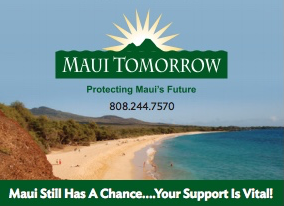Maui Tomorrow has stood with many of Maui’s cultural groups to protect our heritage resources, from Olowalu in West Maui to Nāhiku in East Maui, and from Mākena on Maui’s South shore, to North shore Haʻikū. Maui Tomorrow has partnered with Maui Cultural Lands, Nā Moku ‘Aupuni o Koʻolau , Hui o Nā Wai ‘Ehā and Hoʻoponopono o Makena to advocate for respect of traditional cultural practices on public and private lands. Our commitment to cultural preservation has resulted in effective advocacy. Maui Tomorrow and allies consistently urge landowners and policy makers to “raise the bar” and preserve complexes of inter-related historic sites and native flora and fauna as a larger “cultural landscape.”
There’s tremendous financial pressure to designate our cultural landmarks as “insignificant” and clear them for destruction. However, this shortsighted view deprives future generations of a hands-on chance to learn from the past. In spite of a general lack of enforcement of historic preservation laws, Maui Tomorrow and allies have convinced the State Land Use Commission to reject environmental studies for high profile projects like Olowalu Town and the Piilani Promenade (aka “Kihei Mega Mall”) because the studies failed to fully protect cultural sites and cultural practices on the lands. Any future plans on those lands will need to reflect a cultural landscape view towards the historic sites in the project area.
Maui Tomorrow recently joined other allies to be a voice for the rich cultural heritage of Mākena Landing. Before a legal challenge was filed, only seven cultural sites were slated for preservation across almost fifty acres. A legal settlement now protects around thirty sites and two historic trails, and specifies that updated archaeological work be done to document unrecorded cultural features used and valued by cultural practitioners.
Maui Tomorrow’s work with East Maui farming communities and the legendary lands of Nā Wai ‘Ehā (Wailuku, Waiʻehu, Waiheʻe and Waikapu streams) has resulted in nearly two decades of precedent setting legal efforts to restore Maui’s mauka-makai (“mountains to the sea”) stream flows. Our Maui streams and stream life are unique, and are an important part of our shared heritage. The eyes of the nation are on Maui, as these two historic legal cases will shape future water law decisions. Equally important, the East Maui and Na Wai ‘Eha stream restoration cases give a voice to the forgotten traditional villages and a Hawaiian way of life that is being kept alive by a new generation of kalo (“taro”) farmers and cultural practitioners.
Maui Tomorrow has also long advocated for protection of preserves and open space with high cultural and biological value, such as the 267-acres of Hāmakua Coastal lands in Haʻikū that was purchased and protected in 2016.




